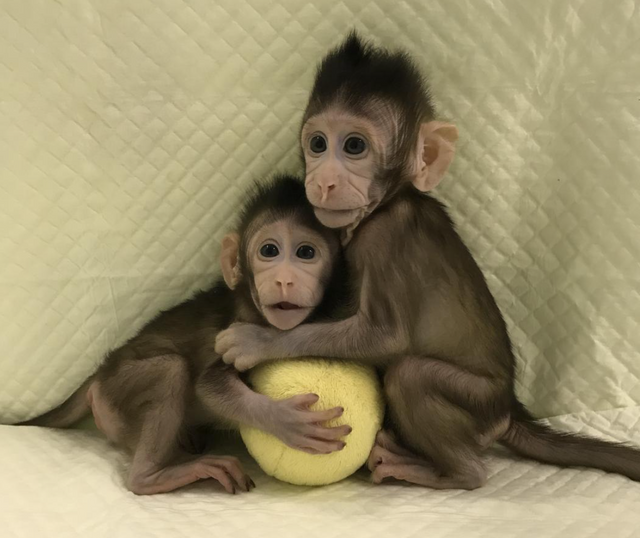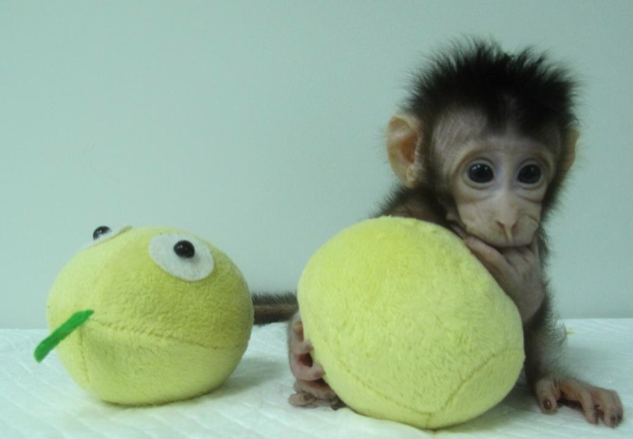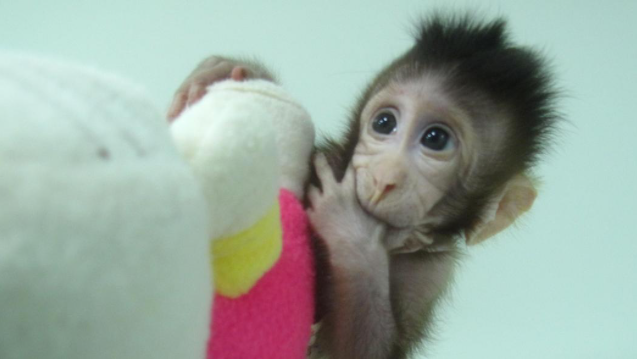[Science] Genetic engineering has breached a line: The first clone monkeys are here
Genetic engineering has breached a line: The first clone monkeys are here

At the end of last year, Chinese researchers witnessed a scientific breakthrough. In November and early December, the genetically identical macaques Zhong Zhong and Hua Hua were born. These monkeys are not only very cute, but also the first primates that were successfully cloned with the so-called somatic cell nucleus transfer. This is the same method that was used about 22 years ago for the first cloned animal, the Dolly sheep.
The researchers at the Chinese Academy of Science hope that cloning genetically identical monkeys will provide unprecedented insights into human diseases. But the birth of Zhong Zhong and Hua Hua also marks a milestone for cloning in particular and genetic engineering in general. In the last 20 years primates have proved to be extremely resistant to cloning experiments. This is due to their unique complex cell structure. The birth of the cloned monkeys heralds a new era in which cloning of other species of monkeys has also come within reach. A first human clone now also seems to be possible - at least in theory.

In somatic cell nucleus transfer, the nucleus of any cell is taken from the animal to be cloned. This nucleus is inserted into a fertilised egg whose own nucleus has been removed beforehand. In 1996 Dolly the sheep was the first animal to be successfully cloned using this method. However, cloning did not work without later complications: The sheep aged early and had to be put down in 2003 because of pneumonia.
In the last 20 years, nuclear cell transfer has also been applied to 23 other animal species, including cows, horses, cats and pigs. These successful experiments gave rise to concerns that mankind was on the verge of breeding designer babies or human clones for organ trafficking. However, the researchers soon discovered that the jump from a cloned sheep to a cloned monkey was much more difficult than expected.
Technically, the first clone of primates was a rhesus monkey called Tetra, born in 1999. Tetra was produced by so-called embryo splitting. This procedure involves the division of a fertilised egg, similar to the natural way in which monozygotic twins are fertilised. Two individual, identical embryos are created which develop independently. Although this method is already well documented, a maximum of four identical offshoots can be obtained from one embryo. In order to obtain a larger number of clones, cell nucleus transfer is necessary, because this method allows the cell nuclei of any cell of the animal to be cloned to be used.
Why primates have not yet been cloned
The special structure of their oocytes is an important factor why they did not want to work with the nuclear transfer of primates until now. The spindle apparatus, a structure of protein fibres that ensures the correct separation and alignment of chromosomes during cell division, is located in the oocytes of primates, centred near the chromosomes. In other mammals, however, the spindles are distributed evenly over the entire egg cell.
The researchers found that the spindle apparatus was injured or confused when the nucleus - and thus all chromosomes - were removed from the ovum of a primate. Thus, the spindles were no longer able to align the chromosomes of the injected nucleus correctly during cell division. Although the researchers succeeded in producing primate embryos in several cases, none of them survived for more than a few weeks in the womb due to defective cell division.
In their study, which appeared in Cell magazine on Wednesday, Sun and his colleagues describe how they were able to overcome this hurdle. They optimized the method by which the cell nucleus is transferred in order to minimize damage to the egg cell. They also added human RNA to the egg. The task of this RNA was to influence the genes that would otherwise have interfered with the embryo's development. To put it in Sun's words, the cell nucleus was "programmed"to formulate the genes needed for embryo development.
Nevertheless, it took some time for the researchers to succeed with this method. According to their own data, they used the cell nuclei of adult cells to produce clones in 42 female monkeys, 22 of which became pregnant. However, only two of these pregnancies resulted in live births, but both babies died a few hours later.

The researchers were more fortunate to use the nucleus from the connective tissue of an aborted monkey fetus. These clones were injected into 21 macaque females and four of them became pregnant. Two of these pregnancies ended in miscarriages within the first two months, but the other two resulted in the birth of two healthy, genetically identical macaques. The researchers claim that the babies are still in good health almost two months later. By the way, the names Zhong Zhong Zhong and Hua Hua were not chosen by chance, the "Zhonghua" means translated as "Chinese Nation".
Even if the cell nucleus transfer method could now theoretically produce clones in series: The effort for creation remains disproportionate. "We tried different methods, but only one of them led to success,"Sun said in a statement. "There have been many failures before we could successfully clone a monkey."
According to Sun, the method used to clone the macaques could also be applied to humans. However, he considers it unlikely that the government would allow cloning of human cells. Apart from the ethical controversy, the method has so far also had a very low success rate for test primates. Nevertheless, nuclear cell transfer is a promising method of producing large populations of genetically identical primates that Sun and his colleagues believe could be used to investigate human diseases. They expect that this will reduce the number of experimental animals needed for the same studies, as the clones will make it easier to test and standardize the methods more quickly.

This post has received a 18.18 % upvote from @sleeplesswhale thanks to: @ddot.
This was really interesting, thanks for the insight!
As a fellow scientist I can't help but see this as a positive, and I look forward to what the future can bring in terms of our scientific endeavors. It's a strange moral ground, but I think as long as it's intention is for the benefit of the human race I'm cool with it, in theory anyway.
excelent topic
Congratulations @ddot! You have received a personal award!
Click on the badge to view your Board of Honor.
Do not miss the last post from @steemitboard:
SteemitBoard World Cup Contest - Belgium vs Japan
Participate in the SteemitBoard World Cup Contest!
Collect World Cup badges and win free SBD
Support the Gold Sponsors of the contest: @good-karma and @lukestokes
Congratulations @ddot! You received a personal award!
You can view your badges on your Steem Board and compare to others on the Steem Ranking
Vote for @Steemitboard as a witness to get one more award and increased upvotes!